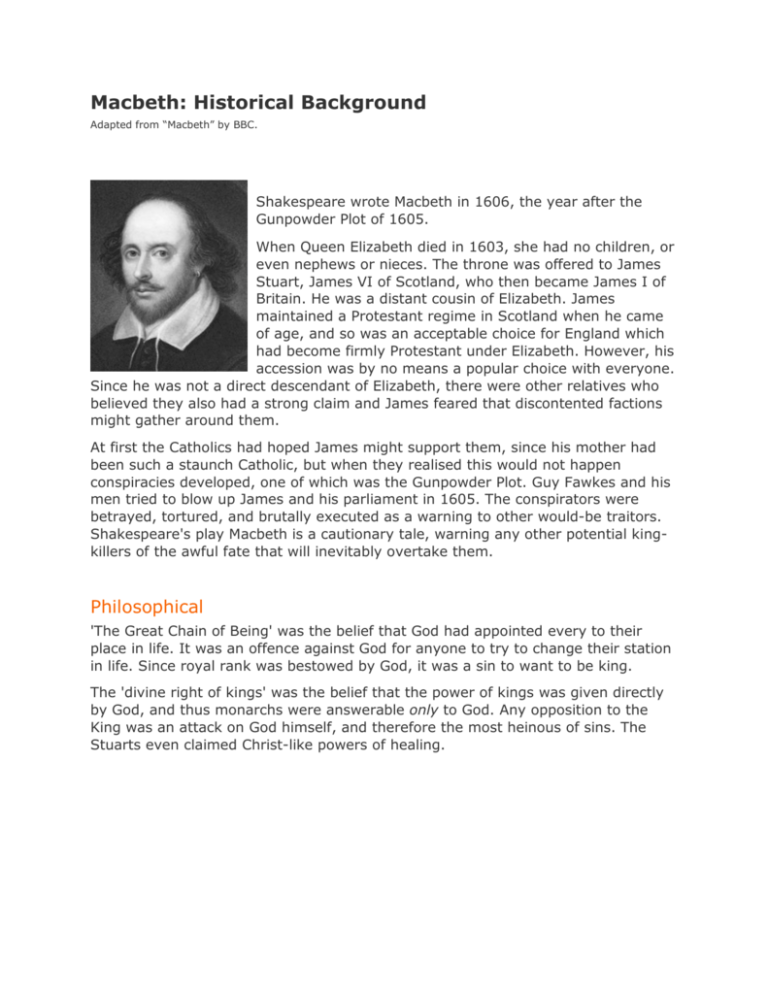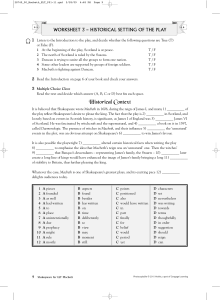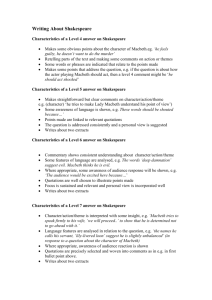Macbeth: Historical Background
advertisement

Macbeth: Historical Background Adapted from “Macbeth” by BBC. Shakespeare wrote Macbeth in 1606, the year after the Gunpowder Plot of 1605. When Queen Elizabeth died in 1603, she had no children, or even nephews or nieces. The throne was offered to James Stuart, James VI of Scotland, who then became James I of Britain. He was a distant cousin of Elizabeth. James maintained a Protestant regime in Scotland when he came of age, and so was an acceptable choice for England which had become firmly Protestant under Elizabeth. However, his accession was by no means a popular choice with everyone. Since he was not a direct descendant of Elizabeth, there were other relatives who believed they also had a strong claim and James feared that discontented factions might gather around them. At first the Catholics had hoped James might support them, since his mother had been such a staunch Catholic, but when they realised this would not happen conspiracies developed, one of which was the Gunpowder Plot. Guy Fawkes and his men tried to blow up James and his parliament in 1605. The conspirators were betrayed, tortured, and brutally executed as a warning to other would-be traitors. Shakespeare's play Macbeth is a cautionary tale, warning any other potential kingkillers of the awful fate that will inevitably overtake them. Philosophical 'The Great Chain of Being' was the belief that God had appointed every to their place in life. It was an offence against God for anyone to try to change their station in life. Since royal rank was bestowed by God, it was a sin to want to be king. The 'divine right of kings' was the belief that the power of kings was given directly by God, and thus monarchs were answerable only to God. Any opposition to the King was an attack on God himself, and therefore the most heinous of sins. The Stuarts even claimed Christ-like powers of healing. Historical Shakespeare's plot is partly based on fact. Macbeth was a real eleventh century Scottish king, but the historical Macbeth, who had a valid right to the throne, reigned capably in Scotland from 1040 till 1057. He succeeded Duncan, whom he had defeated in battle, but the real Duncan was a weak man, around Macbeth's own age, not the respected elderly figure we meet in the play. In reality, Macbeth was succeeded by his own stepson, not by Duncan's son, Malcolm, who came to the throne later. The Stuart kings claimed descent from Banquo, but Banquo is a mythical figure who never really existed. Shakespeare found his version of the story of Macbeth in the Chronicles of Holinshed, a historian of his own time. Holinshed does include a Banquo in his version, but he is also a traitor who assists Macbeth in the murder. As a tribute to the Stuarts, and James in particular, Shakespeare presents Banquo as a wise, noble and regal figure who arouses jealousy in Macbeth. Shakespeare and the Court During the reign of Queen Elizabeth, Shakespeare's acting company was called the 'Chamberlain's Men', and it is known that they performed for the court. After the accession of James they changed their name to the 'King's Men' as a tribute to him. In Macbeth, Shakespeare seeks to flatter and please the King in various ways. Macbeth, the character who usurps the place of a lawful King, is shown as losing everything as a result – he becomes hated and demonised by all his subjects, as does his wife, who supports him in his crime. Banquo, whom the Stuarts claimed as their ancestor, is presented in a completely positive light. When the witches show Macbeth the future, he sees a line of kings descended from Banquo that seems to 'stretch out to the crack of doom'. During his reign as King of Scotland, James is known to have been directly involved in some witch trials at North Berwick. Women were regularly burnt as witches, and Shakespeare presents his witches unequivocally as powerful and evil emissaries of the devil. In his day, the majority of the general public, too, believed in witches and the power of the supernatural, and the witch scenes would have been taken very seriously.







